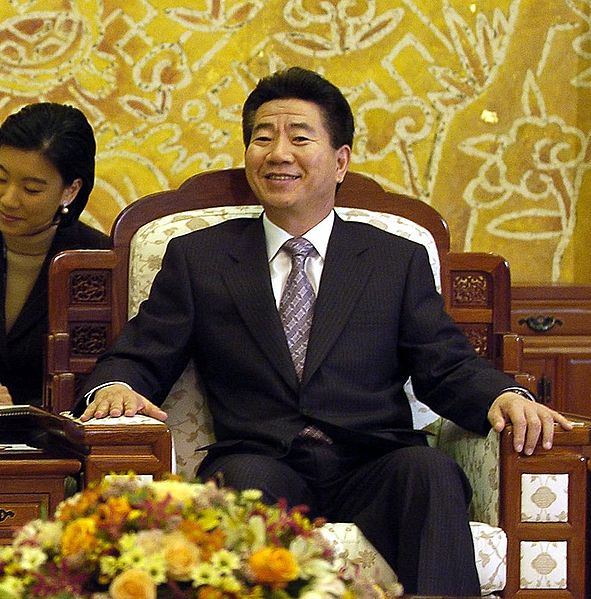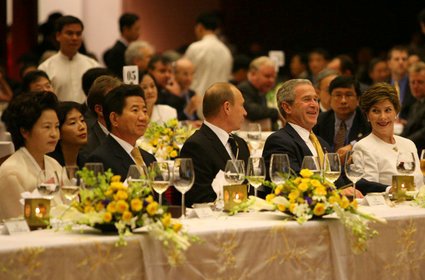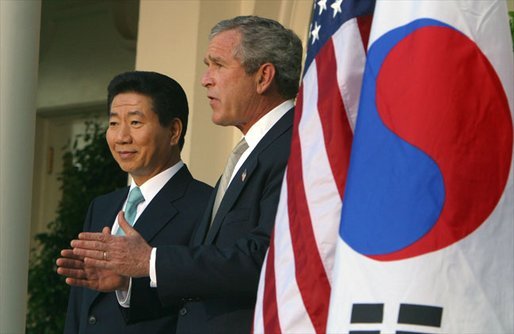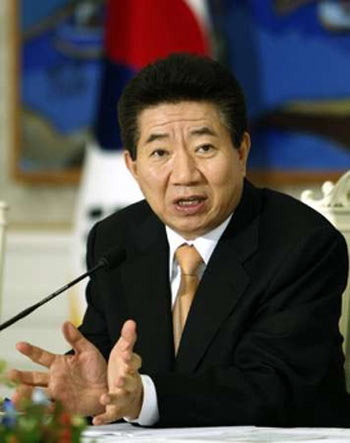<Back to Index>
- Mathematician Jacobus Hendricus "Jack" van Lint, 1932
- Dramatist Emanuel Schikaneder, 1751
- 16th President of the Republic of Korea Roh Moo-hyun, 1946
PAGE SPONSOR
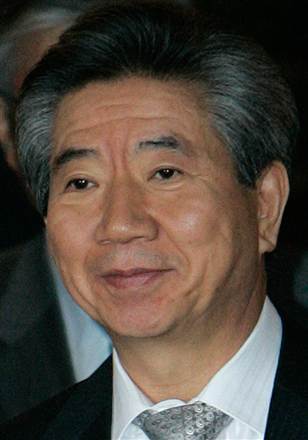
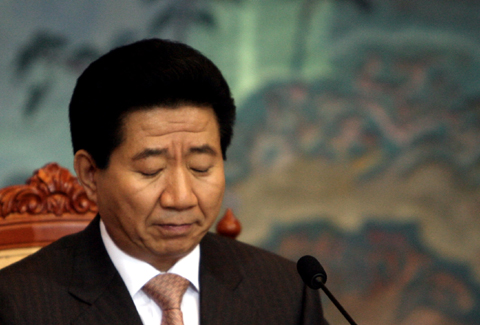
Roh Moo-hyun (Korean pronunciation: [no mu hjʌn]) GOM GCB (1 September 1946 23 May 2009) was the 16th President of South Korea (2003 2008).
Roh's pre-presidential political career was focused on human rights advocacy for student activists in South Korea. His electoral career later expanded to a focus on overcoming regionalism in South Korean politics, culminating in his election to the presidency. The election was strongly influenced by activists on the Internet, and particularly via an internet news provider "OhmyNews" the first time this had ever happened in Korea. Roh's election was notable for the arrival to power of a new generation in Korean politics, the so-called 386 Generation, (i.e. people in their thirties when the term was coined, who had attended university in the 1980s, and who were born in the 1960s). This generation had been veterans of student protests against authoritarian rule, and advocated an assertively nationalist line towards the United States and Japan, and a conciliatory approach towards North Korea. They took up many positions on Roh's staff. Despite high initial hopes, however, Roh's administration quickly became dogged by accusations of incompetence, while Roh's frequent personal clashes with his opponents and critics would eventually undermine public support. Conflict would continue throughout his presidency, which was characterized by continual labor unrest, personal feuds with the media, and diplomatic friction with the United States and Japan. Many of Roh's political gambles, including a plan to move the capital, and a plan to form a coalition with the opposition, also fizzled. One year and two months after leaving office, Roh became the center of a bribery scandal. This scandal, the collapse of the "Pro-Roh faction" of politicians, the collapse of the Uri Party and the defeat of its successor Democratic Party in the National Assembly, and the defeat of Roh's designated successor in the presidential elections, marked a decline in the political fortunes of the 386 Generation that had brought Roh to power. Roh committed suicide on 23 May 2009 by jumping from a mountain cliff, after leaving a suicide note on his personal computer. His suicide was confirmed by police.
Roh Moo-Hyun was born to a poor farming family on 1 September 1946, at Bongha village near Gimhae and Busan, in southeastern South Korea. His parents had three boys and two girls, and Roh was the youngest of his family. In 1953, He entered Dae Chang elementary school and was absent from school quite often to assist his parents. When he was a sixth grader, he became the president of the school with the encouragement of his school teacher.
Roh
Moo-Hyun decided to become a lawyer due to the influence of his elder
brother who studied law and died from a car accident. Roh studied on
his own to pass the bar exam
in 1975 (South Korea does not currently require bar examinees to have
graduated from a college, university, or law school). In 1977, he
became a regional judge in Daejeon, and began practicing tax law in 1978. In 1981, he defended students who had been tortured for possession of contraband literature.
In early 2003, he was quoted as saying, "When I saw their horrified
eyes and their missing toenails, my comfortable life as a lawyer came
to an end. I became a man that wanted to make a difference in the
world." He opposed the autocracy in place at the time in South Korea, and participated in the pro-democracy June Struggle in 1987 against Chun Doo-hwan.
In 1988, Roh was invited by Kim Young-sam to join the Democratic Reunification Party (Korean: 통일민주당) and entered politics. In the same year, he was elected as a member of the National Assembly, representing Dong-gu, Busan. He grilled the government over political corruption allegations in a parliamentary hearing, which won him his first public attention.
In 1990, he did not participate in the Democratic Liberal Party and he criticized Kim Young-sam. Roh lost his seat in the Assembly in 1992, and would later run for the mayorship of Busan in 1995, where he lost again. Shortly after the election, Kim Dae-jung founded the National Congress for New Politics, but Roh did not join, instead criticising the party and Kim Dae-jung unfavourably. In 1996, he ran for an Assembly seat for Jung-gu in Seoul, losing to another future president, Lee Myung-bak.
Roh reconciled with Kim when he endorsed his candidacy in the 1997 Presidential election. Roh returned to office in 1998, when Lee Myung-bak resigned his seat because of a violation of election law, winning a seat in the ensuing by-election.
In 2000, Roh ran for the National Assembly representing Buk-gu and Gangseo-gu in Busan in an attempt to overcome regionalism in Korean politics, but was defeated. His defeat in the election, however, proved fortuitous when his supporters formed Nosamo, the first political fan club in Korea. His supporters were inspired by his commitment to overcoming regionalism.
In 2000, Roh was appointed as the Minister of Maritime Affairs and Fisheries under Kim Dae-jung,
and this position would constitute his major government experience
prior to the presidency. Roh would later use his lack of experience to
his advantage in a presidential campaign, depicting himself as a
newcomer and outsider unbeholden to the traditional business and
political elites. Roh won the presidency on 19 December 2002, by defeating Lee Hoi-chang with
a narrow 2% margin of victory. Roh's surprising election was made
possible by a last minute Internet and text message campaign that
targeted younger voters, as well as a wave of anti - American sentiment that had swept the country in the previous year.
Roh dubbed his administration the "Participatory Government," and entered office intent on introducing an ambitious new agenda. Policy goals for the Roh administration included the continuance of the existing Sunshine Policy of engagement towards North Korea, the establishment of Korea as a business hub in Northeast Asia, the expansion of social welfare, the pursuit of "balanced national development" to help underdeveloped areas, the eradication of corruption, reform of education and tax systems, reform of labor - management relations, reform of mass media, and a recasting of the relationship with the United States and Japan. The Roh administration would stumble early on due to campaign finance scandals within his administration, and a series of gaffes.
Three months into his presidency, Roh bolstered skepticism about his ability and experience when he stated, "I feel incompetent as president and a sense of crisis that I will not be able to perform my presidential duties." Roh set the tone of his administration with a number of political gambles, including threats to quit pursuant to a national referendum, and measures to uncover and reveal the names of the descendants of Japanese collaborators six decades after the Japanese had left Korea. The investigations, criticized by opposition parties as a covert means of attacking them, and coming too late to provide substantive redress, mostly resulted in damage to his own party members.
Roh and his supporters left the Millennium Democratic Party in 2003 to form a new party, the Uri Party (열 린우리당, lit. "Our Open Party"). Roh's popularity was rapidly declining by that point, principally on perceptions of mismanagement of the economy. His conciliatory North Korea policy was derided as appeasement by his opponents, while his decision to send troops to Iraq upon US request was controversial with his dwindling supporters. Controversy within the Ministry of Foreign Affairs and Trade led to the replacement of the Minister, and a contentious free trade treaty with Chile brought farmers to the streets. Labor unrest continued nearly uninterrupted from the time he assumed the presidency.
Directly ahead of the National Assembly elections, Roh voiced support for the Uri Party, which constituted a technical violation of Constitutional provisions mandating presidential impartiality. When Roh refused demands to apologize, opposition lawmakers saw their chance, and on March 12, 2004, the South Korean National Assembly voted to impeach him on charges of illegal electioneering and incompetence. The vote was 193-2 (Uri Party members abstained from the vote). Roh's supporters physically blocked the motion for three days in open combat, and had to be hauled out by security guards. Roh's executive power was suspended pending a final decision by the Constitutional Court, and Prime Minister Goh Kun ran the country as the Acting President.
The
National Assembly's attempt to impeach Roh was largely opposed by the
public. Although Roh's popularity had hovered around 30%, many thought
the impeachment was harsh and heavy handed, and Roh's popularity went
up dramatically soon after the assembly's vote to impeach Roh. The
results of the April 2004 parliamentary election showed public support for him, with the Uri Party winning a majority of seats. On
14 May 2004, the Constitutional Court overturned the impeachment
decision, restoring Roh as President, and allowing Roh to enjoy a brief
period of popular support.
Roh did little to modify his style upon his return, and both his and his party's popularity soon fell again to lower levels than before. As before, perceptions of neglect and mismanagement of the economy outweighed any political considerations. Although exports performed at record levels and the economy grew, growth still lagged behind both the previous administration and the rest of the world, while the domestic economy stagnated. At the same time regulations proliferated, investment capital exited the country, unemployment (especially among the young) increased, wealthy students flocked overseas as the education system stagnated, and housing prices in Seoul soared far beyond the reach of the average citizen. Roh responded by dismissing criticism as "shameless mudslinging," and touted the achievements of his government in increasing national competitiveness, strengthening the economy, and pumping up stock prices. This somewhat cavalier attitude led to his Uri Party suffering consecutive defeats in the Assembly, before eventually collapsing. Roh's unpopularity had become a liability for his party, and a new party was needed to disassociate from him. The Uri Party would thus be revamped and renamed as the Democratic Party, and is currently the main opposition party in the National Assembly.
Roh's ambitious initial promises to establish Korea as an international business hub in Asia faded soon after his election. Instead, Korea under Roh suffered negative publicity in the foreign business community due to prosecutorial investigations on the purchase and sale of Korea Exchange Bank by the Lone Star Fund, spurring foreign investors to join their domestic counterparts in leaving the country. When housing prices soared, Roh responded by drastically raising taxes and imposing price controls, rather than allowing developers to increase supply. This decreased the supply of housing available. At the same time, Roh also increased welfare spending by 18% a year, and drastically increased spending by increasing the size of the civil service by more than 95,700 new hires, or approximately 60 people a day. Criticism of lax discipline among the civil service and police force was high during his reign.
The remainder of Roh's term was characterized by a number of desultory campaigns pursued to varying degrees of success and completion. One of the more successful campaigns (at least during his term) was Roh's pursuit of an FTA with the United States, concluded in April 2007 after many months of negotiations by Kim Hyun-jong, the deputy minister for trade. Roh successfully pushed for the FTA in spite of domestic opposition from his traditional leftist constituency (who denounced it as "neoliberal") and various groups (particularly farmers) opposed to market opening. The FTA, however, is as of yet unratified in the legislatures of both countries.
As
part of his "balanced national development" campaign to reverse the
concentration of wealth in Seoul, Roh also pursued a plan to relocate
the capital 100 miles away to Chungcheong,
ostensibly to relieve congestion. Roh had made this promise during his
campaign, and doggedly pursued its fulfillment, despite convincing few
voters outside the Chungcheong region of the benefits of the move. After
much controversy, the Constitutional Court obviated Roh's plans by
ruling that the relocation of the capital was unconstitutional, thus
inflicting a huge blow to Roh's political standing. Roh's plan was then
amended to the creation of an "administrative capital," though this
plan has also not yet seen completion. The issue of the proposed
"administrative capital" remains controversial as of 2010 in plans for Sejong City, the exact nature of which continues to be a politically divisive issue even within the ruling Grand National Party.
The ruling Uri Party had lost in every by-election under Roh's leadership, and there was no exception in the by-elections held on 30 April 2005, when the party was defeated in every one of the 23 electoral districts. Facing the outcome of his unpopularity, Roh took a rather strange measure to save his presidency when he proposed a grand coalition with the opposition Grand National Party. Roh's rationale was that since it was impossible to continue his presidency with an approval rate of around 20 percent, a grand coalition comprising the Opened We Party and the Grand National Party was desirable, and that the difference between both parties in terms of political agendas was actually minute. Roh promised he would yield much of his power and might even resign from office if a grand coalition was successfully launched.
Roh's
proposal for the grand coalition stirred yet another national
controversy. Many called his plan "reckless and completely ignorant" of
the sentiments of people still ailing from repeated political
controversies and economic hardships. Many of the Opened We Party's
supporters who identify as liberals were enraged at Roh holding that
his party was not really different from the conservative opposition.
The Grand National Party, enjoying relatively strong approval rate but
still bent on revenge for the party's defeat in major elections,
repeatedly declined to initiate a negotiation for the coalition. While
the Opened We Party grudgingly supported the President's proposal, a
lawmaker defected from the party in protest of Roh's plan, and the loss
of popularity was felt when the party suffered yet another complete
defeat in the by-election on 26 October 2005, this time including one
of the party's stronghold electoral districts. Roh's plan was scrapped,
having failed to garner support from either political faction.
Roh was perceived as an anti-American before the presidential race, which was not a handicap during the presidential campaign. Public antipathy to the United States was prevalent in 2002, particularly evoked by the incident where two South Korean middle school girls were crushed to death by a U.S. Army armored bridge laying vehicle (an AVLB). The American soldiers involved were tried by a U.S. Army court martial, but the Roh Administration continued to demand a South Korean trial, despite the clear and obvious fact that the incident occurred 'on duty' (as part of a convoy) and thus was a US responsibility under the Status of Forces Agreement between the US and South Korea. Roh stoked anti-Americanism with this and other events. Roh once remarked that anti - Americanism could be allowable before he won the presidency and it worked in Roh's favor and led many people to believe that he would lead an independentline in terms of relation with the U.S.
However, many Koreans who supported Roh during the presidential campaign felt betrayed when he and the National Assembly decided to deploy troops to Iraq in support of the U.S. led military campaign. Roh explained the deployment as only a peacekeeping mission and claimed that such commitment was required to bring favor from the U.S. in resolving the North Korean nuclear crisis.
In February 2006, Roh announced that South Korea would initiate negotiations with the U.S. for a free trade agreement. Many including Roh's former economic advisor expressed concerns that the government was acting hastily and the effect of the agreement would be detrimental to certain sectors of the nation's economy such as agriculture. Despite such opposition, Roh repeatedly supported the idea.
In April 2007, Roh presided over an emergency meeting of his aides to discuss the diplomatic fallout from the massacre at Virginia Polytechnic Institute in the United States by a South Korean student, Cho Seung-hui, fearing its negative impact on South Korea - U.S. relations. They were discussing comprehensive measures to cope with the unprecedented incident, including issuance of presidential messages of apology and plans to prevent possible harassment of South Koreans living in the United States. Roh issued two messages of condolence already on April 17, 2007.
South Korea's relationship with Japan was in a healthy condition when Roh entered office. However, his first visit to the neighboring country in 2003 was scheduled on a date that coincided with Korean Memorial Day. During the visit, Roh proclaimed he would not seek any more apologies from Japan over its colonial occupation, in the hope of maintaining a friendly relationship between the two countries. Although Roh's proclamation was made in good faith, some expressed concern that Japan may have interpreted this as the termination of its responsibility for the colonial past, and use it as an excuse to deny any claims for compensation that may arise in the future. Despite Roh's hope, relations with Japan deteriorated henceforth, in several areas of conflict such as compensation issues for comfort women, denial of the colonial past in Japanese history textbooks, and disputes over the Liancourt Rocks (Dokdo/Takeshima). Another sensitive issue, former Prime Minister of Japan Junichiro Koizumi's repeated visits to Yasukuni Shrine were harshly criticized in South Korea, and Roh declared no further meetings with Koizumi would take place unless he stopped visiting the shrine.
Although being on bad terms with Japan, a very important trading and tourism partner, was not in Korea's national interest, Roh himself benefited from the disputes. His approval rating saw a momentary surge with every breakout of disputes, and he took advantage of the situation in a number of nationally televised speeches dealing with diplomatic issues.
In an address to the nation on 25 April 2006 regarding disputes over the Liancourt Rocks, Roh reaffirmed that he didn't seek another apology from Japan, but demanded that Japan take action in compliance with its past apologies. The speech was applauded by many Koreans despite Roh's low popularity. The then Prime Minister of Japan Junichiro Koizumi characterized the speech as intended for domestic audiences.
After leaving office, Roh retired to
Bongha Maeul,
a small village in his hometown. This marked a break with previous
custom, where former presidents retired to heavily guarded houses in
Seoul. Bongha a village of 121 people became a minor tourist attraction due to Roh's presence.
On 7 April 2009, Chung Sang-Moon,the former secretary of Roh Moo-hyun was arrested on charges. In early 2009, allegations of corruption had begun to surface regarding the former President's family and aides, eventually leading to the indictment of Roh's elder brother Roh Gun-Pyeong on suspicion of influence peddling. It soon became clear that investigation would have to expand to encompass Roh Moo-Hyun's aides, as well as other members of his family. As the investigation closed in on Roh's former secretary, Chung Sang-Moon, Roh made the surprise announcement on his website that "The accusation should be directed at our household, not Chung. Our household made the request, received money and used it." At the same time, Roh claimed that he himself had not known of the money transfer before his retirement. By May 2009, prosecutors had summoned Roh's wife, son, and eventually the former President himself on suspicion of receiving a total of 6 million dollars in bribes from Park Yeon-Cha, a businessman close to the ex-President. Roh was subject to initial written questioning by prosecutors, before direct questioning, prior to which he apologized again to the public and stated that "he was overwhelmed by shame."
Roh's investigation for corruption proved especially disappointing to his supporters because he had campaigned on pledges to "clean up the presidency," and root out corruption, while condemning his opponents as hopelessly corrupt.
In one speech to commemorate the 20th anniversary of Korea's "June Struggle" for democracy, Roh vehemently attacked critics who described him as incompetent, stating, "They even deal out the absurd rhetoric that they would rather have a corrupt administration than an inept one while openly revealing their true colors as forces of corruption and the security driven dictatorships of the past. Whats more, they label the democratic forces as being inept, plotting to rise to power on the back of the nostalgia for the development oriented dictatorships of the past."
Roh's characteristically self - righteous stance resulted in harsh condemnation of the ex-President for hypocrisy when the scandal broke, a criticism he himself acknowledged in a message on his website when he stated, "I have lost my moral cause just with the facts I have so far admitted. The only thing left is the legal procedure" Roh further added, "What I have to do now is bow to the nation and apologize. From now on, the name Roh cannot be a symbol of the values you pursue. I'm no longer qualified to speak about democracy and justice.... You should abandon me." Despite these appeals, Roh continued to deny all knowledge of the receipt of money by his family from Park Yeon-Cha, in contradiction to Park's testimony. Roh refused cross examination with Park.
In contrast to scandals involving previous Presidents, who reportedly used illicit funds to finance political campaigns, Roh's family have used borrowed funds for personal use, such as the payment of living expenses for study in the United States.
Roh Moo-Hyun died on 23 May 2009 after allegedly jumping from a 45-meter (150 ft) cliff known as Bueong'i Bawi (lit. Owl's Rock) behind his rural home in his home village of Bongha. He sustained serious head injuries and was sent by car (not by ambulance) to Seyoung hospital nearby at 7:20 and moved to Busan University Hospital at around 8:15 a.m. (and pronounced dead at around 9:30 a.m. (00:30 GMT). According to police, Roh left a suicide note on his computer apologizing for making "too many people suffer" and requested that his body be cremated.
I am in debt to so many people. I have caused too great a burden to be placed upon them. I can't begin to fathom the countless agonies down the road. The rest of my life would only be a burden for others. I am unable to do anything because of poor health. Do not be too sad. Isn't life and death all a part of nature? Do not be sorry. Do not feel resentment toward anyone. It is fate. Cremate me. And leave only a small tombstone near home. I've thought on this for a long time.
Roh's death was reported as being a suicide by the South Korean police, though there are many who doubt this conclusion, given the fact that the death was announced as a suicide before any evidence was found. Current President Lee Myung-bak stated that "the news was truly unbelievable and deeply sad." Justice Minister Kim Kyung-han said the corruption case against him would be formally closed. However, he did not say whether the former president's family would continue to be investigated.
Roh's suicide follows the suicide of a number of high profile figures under corruption investigations in Korea in recent years, including the former secretary of Prime Minister Kim Young-chul, former Busan mayor Ahn Sang-Young (who committed suicide while in prison), Park Tae-young, former governor of Jeolla province, and Chung Mong-hun, a former Hyundai executive. Roh himself had been sued by the widow of former Daewoo E&C head Nam Sang-Guk for allegedly making defamatory comments that drove her husband to throw himself off of a bridge. Roh's suicide was followed later in the year by the suicide of another politician, the Mayor of Yangsan, who was being subject to a corruption investigation.
By 27 May, Roh's bodyguard revealed that he was not with the former president when he committed suicide. Roh's public funerary ceremony involved both Buddhist and Catholic rites. Hundreds of thousands of supporters turned out to pay their respects in memorial shrines erected around the country, as did President Lee Myung-bak and numerous other prominent politicians. Sporadic violent demonstrations in Seoul immediately after the funeral resulted in the detention of 72 people.
Roh's
suicide resulted in a sudden positive shift in domestic perception
towards the late President, leading one critical professor to comment, "How could he become an instant saint upon his suicide?" Such
shifting perception once again left President Lee Myung-bak vulnerable
to criticism. Perceptions of an excessive investigation on Roh's
alleged improprieties boosted support for the opposition Party (itself
formed when Roh's then unpopularity made it a liability to be
associated with him), giving them enough leverage to demand that
President Lee Myung-bak apologize for the "politically motivated"
investigation they claimed caused Roh's death, and discipline those
responsible. Support for the opposition party increased to 28.3%, outpolling the ruling GNP at 23.5%. The Democratic Party also decided to block the scheduled opening of the
National Assembly until the Lee Myung-bak government accepted responsibility for Roh's suicide. The chief prosecutor in Roh's bribery case also resigned. After
a year after Roh passed away, his autobiography was published by his
personal and political fellows. Based on Roh's previous books,
unpublished draft, notes, letters or the interviews, it follows Roh's
life from birth to death.
In January 2010, dissatisfaction with the poor electoral showing of the minority Democratic Party, and a posthumous reappraisal of Roh Moo-hyun's presidency spurred the creation of a new party, the "People's Participation Party." This party was created to "revive the spirit of former President Roh Moo-hyun."
The Institute for Future Korea (한국미래발전연구원) is established for researching and promoting Roh Moo-hyun's social ideas.
